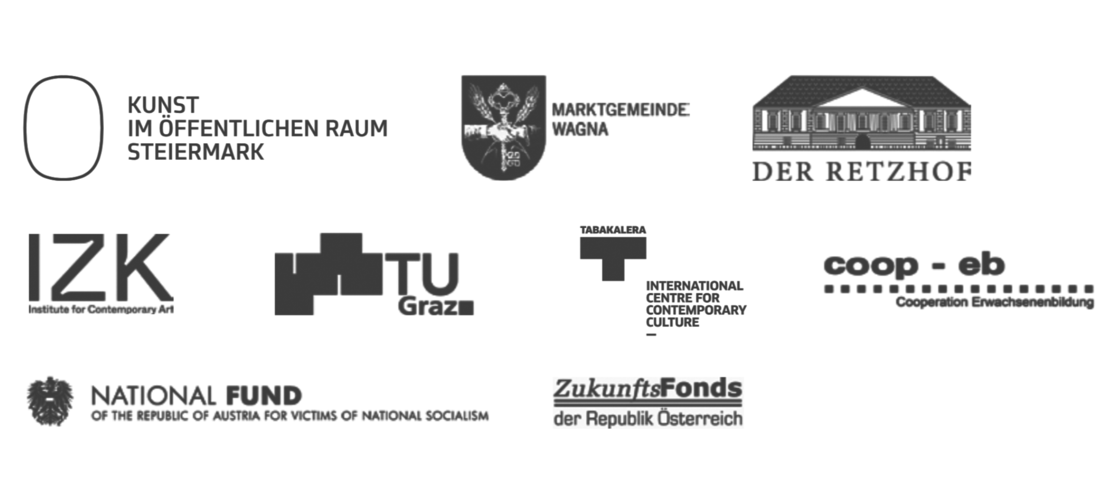Conference
November 8–9, 2019, 10am
Universalmuseum Joanneum
8010 Graz
Austria
A conference with: Éric Alliez / Ivana Bago / Bassam El Baroni / Brenna Bhandar / Seçil Binboğa / Virginia Black / Eray Çayli / Filipa César / Rui Gomes Coelho / Doplgenger / Alessandra Ferrini / Andrew Herscher / Alfredo Gonzalez Ruibal / Anne Historical / Anousheh Kehar / Charlotte Malterre-Barthes / Ana Peraica / Bertrand Perz / Karin Reisinger / Walid Sadek / Shela Sheikh / Branimir Stojanović
Special guest: Franz Trampusch
Convened and moderated by architect and writer Dubravka Sekulić and artist Milica Tomić, in conversation with curator Övül Ö. Durmusoglu, researcher Philipp Sattler, and art historian Jelena Vesić.
It is imperative to consider World War II and National Socialism as a moment in time when once colonial practices took hold on the European continent. Having spread across territories and soils, these practices, continue to inform our ideas of species, race, and gender, permeating our behaviors, institutions, and imaginary into the present day. Evolving from the loaded and manifold agency of soil, the conference “Life of Crops” seeks to uncover the inscription of war and labor from within the earth, starting with the repressed history of the labor camp Aflenz an der Sulm in the south of Austria (1944-1945). Learning from post-processual archaeology, and employing a wide range of analyses and approaches, soil reveals itself as an agent in building ideological hierarchies of class and race through the relations of labor and property ownership.
Life of Crops: Towards an Investigative Memorialization is the foundational component of a collaborative project Aflenz Memorial in Becoming initiated by artist Milica Tomić that considers memorialization as an investigative and anti-commemorative practice of reassembling, actualizing, and activating knowledge in the present. We have invited thinkers who in their work understand the limits and the epistemic violence existing at the core of their disciplinary formations, mainly from disciplines whose knowledge is crucial for unpacking the “spatial event” and its resonance: understanding war as an integral instrument of capital (Alliez), the conference “Life of Crops,” posits privatization and property as a juridical concept in colonialism (Bhandar) as crucial for capitalism’s capacity to racialize (Herscher), and National Socialism as an attempt at absolute privatization (Stojanović). The conference looks at how ‘neutralized’ concepts such as cultivation (Bhandar), plantation (Binboğa), and expertise (Çaylı and Malterre-Barthes) are used to further enclose not only bodies, nature, and land, but also the imaginary (Malcomess) and perception (Peraica). The concept of property, which turns soil and land from living things into an abstraction, produces a new type of subjectivity, defined by the ability to own not only the land and what grows and lives on it, but also those who work it (Coelho). With the emergence of the figure of the worker, as one who does not own anything, freedom and labor power cannot be decoupled from slavery, which continuously shapes the organization of labor to this day (Perz, doplgenger, Ferrini). The scorched earth (Kehar) and bare bones (Bago), rendered mute and suspended in time by capital, are not without past and future, nor are they without their own knowledges.
By refusing to return to the “normative” as defined by capital, both ruin (Sadek) and desert (El Baroni), rather than being understood as a failure to be productive, can be seen as world-making realities in which the epistemic violence of capital is acknowledged and countered.
This means also recognizing the work by the non-anthropogenic factors, such as the work of soil to repair and reconstruct (Reisinger). While soil plays an important role in the construction of fascist and colonialist narrative and imaginary, enclosing techniques such as agronomy or seed engineering can become instruments of anti-colonial struggle (Cesar) and carriers of memory and resistance (Sheikh), precisely because of their power to activate a countermemory of soil (González-Ruibal). Thinking towards an anti-capitalist and anti-colonial horizon, even cultivation (Black) and property (Stojanović) can make equitable worlds.


